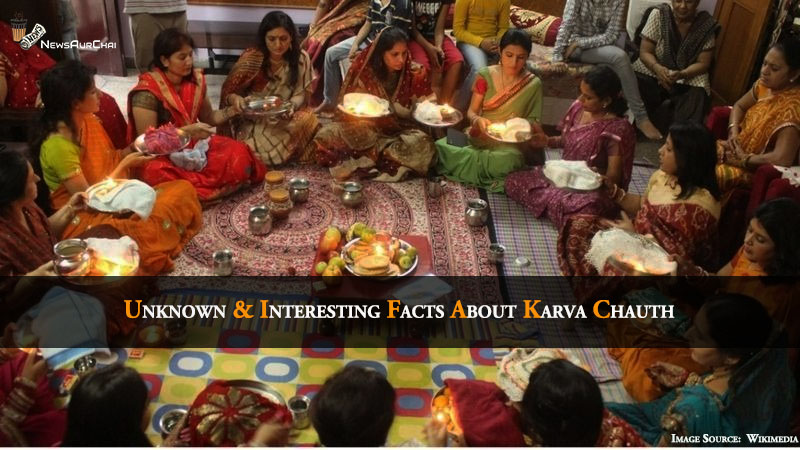Unknown & Interesting Facts About Karva Chauth

1. The real Meaning of Karva
Karva is another word for ‘pot’ (a small earthen pot of water), and chauth means ‘fourth’ in Hindi (a reference to the fact that the festival falls on the fourth day of the dark fortnight, or krishna paksh, of the month of Kartik).
2. Rabi crop & Karva Chauth
It is uncertain how the festival originated and how it came to be celebrated only in the northwestern part of the Indian subcontinent. One hypothesis is that military campaigns and long-distance travel usually resumed around the time of the festival, as the area dried and numerous rivers of the region subsided from the effects of the monsoon. Women observed the fast to pray for the safety of their husbands at this time as they ventured away from home. The festival coincides with the wheat-sowing time (i.e., the beginning of the Rabi crop cycle). Big earthen pots in which wheat is stored are sometimes called Karvas, so the fast may have begun as a prayer for a good harvest in this predominantly wheat-eating region.
3. Karva Chauth is a one-day festival
Karva Chauth is a one-day festival celebrated by Hindu women in North India in which married women fast from sunrise to moonrise for the safety and longevity of their husbands. The fast is observed in the states of Uttarakhand, Uttar Pradesh, western Bihar, Himachal Pradesh, Jammu and Kashmir, Haryana, Punjab, Rajasthan, Chhattisgarh, Madhya Pradesh and Gujarat. The festival falls on the fourth day after the full moon, in the Hindu lunisolar calendar month of Kartik. Sometimes, unmarried women observe the fast for their fiancés or desired husbands.
4. Stories of Karva Chauth
There are legends associated with the Karva Chauth festival. In some tellings, the tales are interlinked, with one acting as a frame story for another.
5. The Story of Queen Veervati
A beautiful queen called Veervati was the only sister of seven loving brothers. She spent her first Karva Chauth as a married woman at her parents’ house. On sunrise, she began a strict fast. However, by evening, was desperately waiting for the moonrise as she suffered severe thirst and hunger. Her seven brothers couldn’t bear to see their sister in such distress and created a mirror in a pipal tree that made it look as though the moon had risen. The sister mistook it for the moon and broke her fast. The moment she ate, word arrived that her husband, the king, was dead. Heartbroken, she wept through the night until her shakti compelled a Goddess to appear and ask why she cried. When the queen explained her distress, the Goddess revealed how she had been tricked by her brothers and instructed her to repeat the Karva Chauth fast with complete devotion. When Veervati repeated the fast, Yama was forced to restore her husband to life.
6. The Story of Bothers to trick their Sister
In a variant of this story, the brothers build a massive fire behind a mountain instead and trick their sister by convincing her that the glow is the moon. She breaks her fast and word arrives that her beloved husband has died. She immediately begins running to her husband’s house, which is somewhat distant and is intercepted by Shiv-Parvati. Parvati reveals the trickery to her, cuts her little finger to give the wife a few drops of her holy blood–and instructs her to be careful in keeping the complete fast in the future. The wife sprinkles Parvati’s blood on her dead husband and, coming back to life; they are reunited.
7. The Legend of Mahabharata
The belief in this fast and its associated rituals goes back to the pre-Mahabharata times. Draupadi, too, is said to have observed this fast. Once Arjun went to the Nilgiris for penance, and the rest of the Pandavas faced many problems in his absence. Draupadi, out of desperation, remembered Lord Krishna and asked for help. Lord Krishna reminded her that on an earlier occasion when Goddess Parvati had sought Lord Shiva’s guidance under similar circumstances–she had been advised to observe the fast of Karva Chauth. In some tellings of this legend, Shiva tells Parvati the story of Veervati to describe the Karva Chauth fast. Draupadi followed the instructions and observed the fast with all its rituals. Consequently, the Pandavas were able to overcome their problems.





